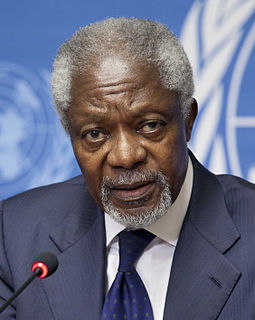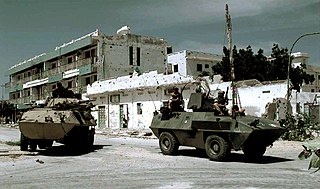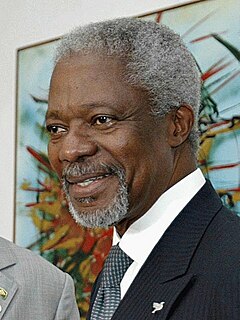
Kofi Atta Annan was a Ghanaian diplomat who served as the seventh Secretary-General of the United Nations from January 1997 to December 2006. Annan and the UN were the co-recipients of the 2001 Nobel Peace Prize. He was the founder and chairman of the Kofi Annan Foundation, as well as chairman of The Elders, an international organization founded by Nelson Mandela.

The Secretary-General of the United Nations is the chief administrative officer of the United Nations and head of the United Nations Secretariat, one of the six principal organs of the United Nations.

Boutros Boutros-Ghali was an Egyptian politician and diplomat who was the sixth Secretary-General of the United Nations (UN) from January 1992 to December 1996. An academic and former Vice Foreign Minister of Egypt, Boutros-Ghali oversaw the UN over a period coinciding with several world crises, including the breakup of Yugoslavia and the Rwandan genocide. He went on to serve as the first Secretary-General of the Organisation internationale de la Francophonie from 16 November 1997 to 31 December 2002.

United Nations Security Council resolution 940, adopted on 31 July 1994, after recalling resolutions 841 (1993), 861 (1993), 862 (1993), 867 (1993), 873 (1993), 875 (1993), 905 (1994), 917 (1994) and 933 (1994), the Council permitted a United States-led force to restore President Jean-Bertrand Aristide and authorities of the Government of Haiti, and extended the mandate of the United Nations Mission in Haiti (UNMIH) for an additional six months.

Angela Evelyn Vernon King was a Jamaican diplomat. She worked for the United Nations for 38 years, from 1966 to 2004, working mainly for equal rights for women. She was appointed Assistant Secretary-General for gender issues in 1997, remaining in that post until she retired in 2004.

Ahmedou Ould-Abdallah is a Mauritanian diplomat who was a senior United Nations official.
United Nations Security Council resolution 720, adopted unanimously at a closed meeting on 21 November 1991, having considered the question of the recommendation for the appointment of the Secretary-General of the United Nations, the Council recommended to the General Assembly that Mr. Boutros Boutros-Ghali be appointed for a term of office from 1 January 1992, to 31 December 1996.

United Nations Security Council resolution 775, adopted unanimously on 28 August 1992, after reaffirming resolutions 733 (1992), 746 (1992), 751 (1992) and 767 (1992) considering a report by the Secretary-General Boutros Boutros-Ghali on the ongoing civil war in Somalia, the Council decided to increase the strength of the United Nations Operation in Somalia I by an additional 3,000 personnel.

United Nations Security Council resolution 827, adopted unanimously on 25 May 1993, after reaffirming Resolution 713 (1991) and all subsequent resolutions on the topic of the former Yugoslavia, approved report S/25704 of Secretary-General Boutros Boutros-Ghali, with the Statute of the International Tribunal as an annex, establishing the International Criminal Tribunal for the former Yugoslavia (ICTY).
United Nations Security Council resolution 1002, adopted unanimously on 30 June 1995, after recalling resolutions 621 (1988), 658 (1990), 690 (1991), 725 (1991), 809 (1993), 907 (1994), 973 (1995) and 995 (1995), the Council discussed the implementation of the Settlement Plan in Western Sahara and extended the mandate of United Nations Mission for the Referendum in Western Sahara (MINURSO) until 30 September 1995.

United Nations Security Council Resolution 1715, adopted by acclamation at a closed meeting on October 9, 2006, having considered the question of the recommendation for the appointment of the eighth Secretary-General of the United Nations, the Council recommended to the General Assembly that Mr. Ban Ki-moon of South Korea be appointed for a term of office from January 1, 2007, to December 31, 2011.

United Nations Security Council resolution 1062, adopted unanimously on 28 June 1996, after recalling all resolutions on Cyprus, particularly resolutions 186 (1964), 939 (1994) and 1032 (1995), the Council expressed concern at the lack of progress in the political dispute in Cyprus and extended the mandate of the United Nations Peacekeeping Force in Cyprus (UNFICYP) until 31 December 1996.

United Nations Security Council resolution 1079, adopted unanimously on 15 November 1996, after recalling previous resolutions on Croatia including 1023 (1995), 1025 (1995), 1037 (1996), 1043 (1996) and 1069 (1996), the Council extended the mandate of the United Nations Transitional Authority for Eastern Slavonia, Baranja and Western Sirmium (UNTAES) until 15 July 1997.

United Nations Security Council resolution 1087, adopted unanimously on 11 December 1996, after reaffirming Resolution 696 (1991) and all subsequent resolutions on Angola, extended the mandate of the United Nations Angola Verification Mission III until 28 February 1997.

United Nations Security Council resolution 1091, adopted without a vote at a closed meeting on 13 December 1996, the Council acknowledged the contributions of the outgoing Secretary-General, Boutros Boutros-Ghali, whose term would expire on 31 December 1996.

United Nations Security Council resolution 1358, adopted by acclamation at a closed meeting on 27 June 2001, having considered the question of the recommendation for the appointment of the Secretary-General of the United Nations, the Council recommended to the General Assembly that Mr. Kofi Annan be appointed for a second term of office from 1 January 2002, to 31 December 2006.

United Nations Security Council Resolution 1733, adopted by acclamation at a closed meeting on December 22, 2006, after recognising the role of the Secretary-General of the United Nations, the Council paid tribute to Kofi Annan, whose term as Secretary-General would come to an end on December 31, 2006.
United Nations Secretary-General selection is the process of selecting the next Secretary-General of the United Nations. To be selected as Secretary-General, a candidate must receive the votes of at least 9 members of the United Nations Security Council, with no vetoes from permanent members. The Secretary-General is then appointed by a majority vote of the United Nations General Assembly.

A United Nations Secretary-General selection was held in 1996 at the end of Boutros Boutros-Ghali's first term. Boutros-Ghali ran unopposed for a second term and received the support of 14 of the 15 members of the United Nations Security Council. However, the United States vetoed his re-selection and eventually forced him to withdraw his candidacy.

A United Nations Secretary-General selection was held in 1991 to replace Javier Pérez de Cuéllar, whose second term would end on 31 December 1991. Boutros Boutros-Ghali of Egypt was selected for a term ending on 31 December 1996, becoming the first Secretary-General from Africa.














